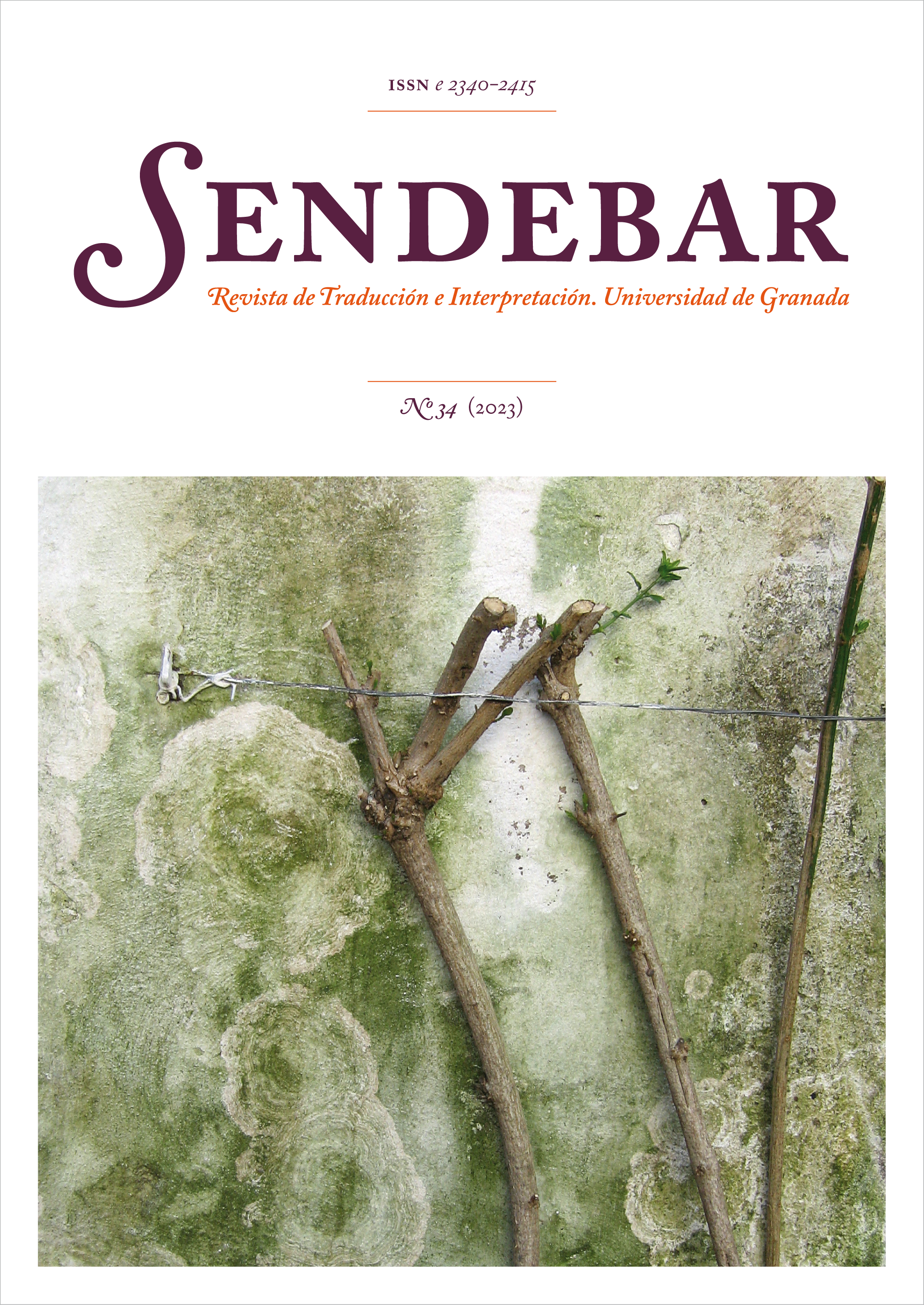‘Life is baseball’ vs. ‘A vida é futebol’: la traducción de metáforas deportivas del inglés al portugués de Portugal y al portugués de Brasil
DOI:
https://doi.org/10.30827/sendebar.v34.26868Palabras clave:
traducción ingles-portugués, traducción automática (TA), metáforas y expresiones idiomáticas del deporte, series de TV, subtitulaciónResumen
El fútbol es el deporte más popular en Brasil y Portugal, mientras que en los Estados Unidos el deporte rey es el béisbol. Los deportes son una extraordinaria fuente de metáforas y expresiones idiomáticas para las lenguas donde se practican. Dichas expresiones constituyen un gran reto tanto para los sistemas de traducción automatizada (TA) como para la traducción humana (TH), debido a su especificidad cultural.
Este trabajo estudia las diferentes posibilidades de traducción del inglés al portugués de expresiones metafóricas relacionadas con el béisbol. El estudio se basa en el TV Corpus, así como en un corpus propio. Las traducciones de tres sistemas de TA en línea de libre acceso (Google, DeepL y Systran) se compararán con las TH de los subtítulos de series de televisión. El análisis tendrá en cuenta tanto la variante de portugués de Portugal como la de Brasil. Los resultados del análisis muestran que las expresiones metafóricas e idiomáticas relacionadas con el deporte siguen siendo un punto ciego para los sistemas de TA inglés-portugués.
Descargas
Citas
Baker, M. (1992). In Other Words – A Coursbook of Translation. Routledge.
Conca, M. & Guia, J. (2014). La fraseologia. Principis, mètode i aplicacions. Bromera /Institut Interuniversitari de Filologia Valenciana.
Corpas, G. (1997). Manual de fraseología española. Gredos.
Corpas, G. (2000). Acerca de la (in)traducibilidad de la fraseología. In G. Corpas (ed.), Las lenguas de Europa: Estudios de fraseología, fraseografía y traducción (pp. 483-522). Comares.
Díaz Cintas, J. & Anderman, G. (2009). Audiovisual Translation. Language Transfer on Screen. Palgrave Macmillan.
Díaz Cintas, J. & Remael, A. (2014). Audiovisual Translation: Subtitling. Routledge.
Díaz Cintas, J. & Remael, A. (2020). Subtitling. Concepts and Practices. Routledge.
Díaz Ferrero, A.M. & Monteiro Plantin, R.S. (2020): A tradução da fraseologia como estratégia de ensino de línguas próximas. Limite, Revista de Estudios Portugueses y de la Lusofonia, 14, 101-127.
Dwyer, T. (2017). Speaking in Subtitles: Revaluing Screen Translation. Edinburgh University Press.
Fernando, C. & Flavell, R. (1981). On Idiom. Critical Views and Perspectives. University of Exeter.
Fuentes-Luque, A. & Santamaria, A. (2020). Machine translation systems and guidebooks: an approach to the importance of the role of the human translator. Onomázein Special Issue VII, 63-82.
Gibbs, R.W. et al. (1989). How to kick the bucket and not decompose: Analyzabitity and idiom processing. Journal of Memory and Language, 28, 576-593.
Gibbs, R.W., & O’Brien, J. E. (1990). Idioms and mental imagery: The metaphorical motivation for idiomatic meaning. Cognition, 36, 35-68.
Gibbs, R.W. (1996). Why many concepts are metaphorical. Cognition, 61, 309–319.
Gibbs, R.W. et al. (1997): Metaphor in Idiom Comprehension, Journal of Memory and Language, 37, 141-154.
Gibbs, R.W. (2001). Proverbial themes we live by, Poetics, 29, 167-188.
Labarta Postigo, M. (2020). A metaphorical map of subtitling. Idiom vs. explicit meaning in translated filmic texts, Babel, 66 (1), 46-69.
Labarta Postigo, M. (2021). ¿Se te ha ido la olla? o ¿você é maluco? vs. are you (fucking) nuts?: La traducción de locuciones del inglés en series de TV por internet”, Lengua y habla, 25, 319-343.
Labarta Postigo, M. (2022). Metaphorical dimension of idioms in TV series for German, Norwegian and Spanish audiences, Estudios de traducción, 12, 151-162.
Lakoff, G. & Johnson, M. (1980). Metaphors We Live By. University of Chicago Press.
Lakoff, G. (1993). The Contemporary Theory of Metaphor. In A. Ortony (ed.), Metaphor and Thought (pp. 202-251). Cambridge University Press.
Newmark, P. (1988). A textbook of translation. Prentice Hall International.
Poibeau, T. (2017). Machine Translation. The MIT Press.
Trim, R. (2007). Metaphor Networks. The Comparative Evolution of Figurative Language. Palmgrave Macmillan.
Burns, Ken, (1994). The Official History of Baseball, Volume 1, [https://www.youtube.com/watch?v=HMZzsV3xi8Q]
Cambridge Dictionary [https://dictionary.cambridge.org/dictionary/english/].
Collins Dictionary [https://www.collinsdictionary.com/us/dictionary/english/].
Daniels, G. & Klein, H. (Executive Producers). (2020). Upload [TV Series]. Deedle-Dee Productions; 3 Arts Entertainment; Reunion Pacific Entertainment; Baral-Waley Productions (pilot); Amazon Studios.
Feldman, L. (Executive producer). (2019-2022). Dead to me [TV Series]. Gloria Sanchez ProductionsVisualized, Inc.; CBS Studios.
Gattiss, M. & Moffat, S. (Executive Producers). (2010-2017). Sherlock [TV Series]. Harstwood Films; BBC Wales; WGBH (Production Companies).
Grammarist [https://grammarist.com/].
Merrian-Webster Dictionary [https://www.merriam-webster.com].
Sherman-Palladino, A., Palladino, D., Polone, G., Rosenthal, D.S. (Executive Producers). (2000-2007). Gilmore Girls [TV Series]. Dorothy Parker Drank Here Productions; Hofflund/Polone; Warner Bross.
Willimon, B. (Creator). (2013-2018). House of Cards [TV Series]. MRC, Trigger Street Productions, Wade/Thomas Productions, Knight Takes King Productions (Production Companies).
Descargas
Publicado
Cómo citar
Número
Sección
Licencia
Derechos de autor 2023 Maria Labarta Postigo

Esta obra está bajo una licencia internacional Creative Commons Atribución-NoComercial 4.0.
Terminos de Licencia Sendebar.

















